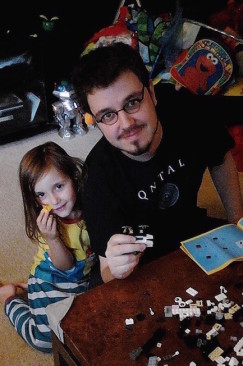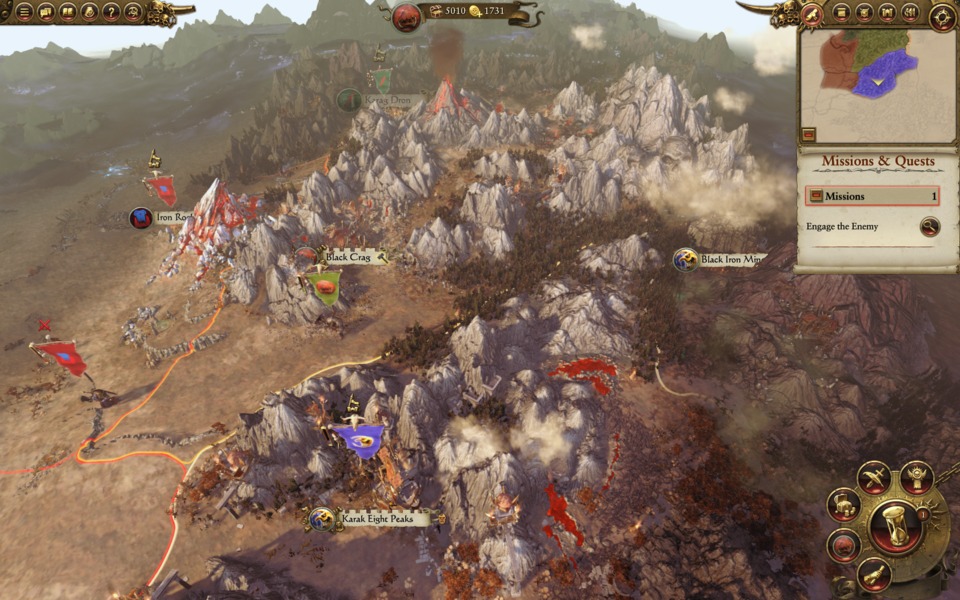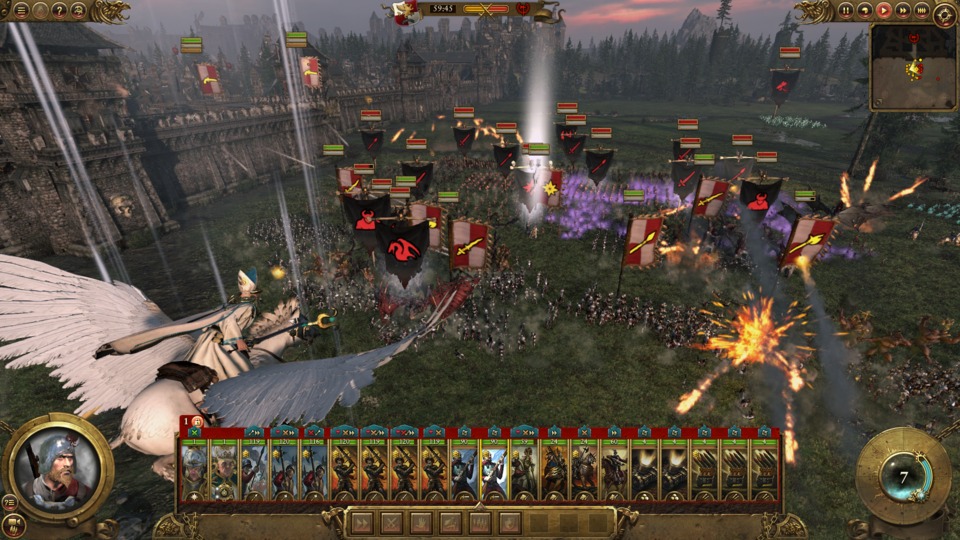
For over 35 years, Games Workshop’s twin fantasy worlds of Warhammer Fantasy Battle and Warhammer 40,000 (or 40K) have loomed over the tabletop gaming landscape. No less influential to miniatures wargaming than Dungeons & Dragons has been to roleplaying, they’ve long served as a British corollary to D&D: Innovative, with just a touch of the derivative to make them familiar to anyone familiar with fantasy or sci-fi, and deeply meaningful to game designers who have now had three generations to stew in the world of design which their influential forebears created.
Still, Warhammer is an odd duck. Superficially, the fantasy world isn’t anything special: There are bland humans, snooty Elves profane, salt of the earth Dwarves, and violent Orcs. Underpinning the Warhammer universe, however, is a sense of the odd. Warhammer’s Old World, a funhouse mirror of early Renaissance Europe displays a startling class consciousness missing in many fantasy worlds; the roleplaying game owes just as much to Michael Moorcock as Tolkien, particularly in early editions of Warhammer in which the dread forces of Chaos are presented as morally agnostic, as liable to enact needed change on a static world as destroy it. It was what mortals did with this primordial force which made it good or evil.
Warhammer owes a deep debt to the heavy metal culture of the 70s and 80s. Not the glam metal culture which took hold in the United States, but the world of the New Wave of heavy metal, the world of Motorhead, Judas Priest, and Iron Maiden. Like that era of heavy metal, Warhammer Fantasy feels acutely working class, and had a sharp sense of class consciousness to boot—the roleplaying game set in the world famously relegates starting characters to largely peasant occupations, mostly via the randomness of “birth”, (i.e. dice). Even the designers of Games Workshop’s glory years fit this aesthetic, with shaggy hair, bad shaving jobs, and ripped jeans in every photo. And Warhammer is deceptively funny for a world where life is cheap and skulls adorn every physical surface; it’s a humor reliant on puns, gallows humor, and bad German (the fulcrum of the game’s fiction is always in the Empire, an even-more-fractious version of the Holy Roman Empire).

To say that Games Workshop dominated a large section of the gaming consciousness is an understatement. In the UK, Games Workshop largely was gaming. Their stores were everywhere, packed to the gills in the 80s and 90s. Warhammer and 40K dominated non-historical wargaming so much during that period that nobody else could get shelf space in independent stores. If you were a wargamer, you played one of Games Workshop’s games. If you ran or worked in a gaming store, you stocked their stuff and set aside days for people to come in to play, or you lost big money.
With all this dominance, it was curious that, for years, Games Workshop rarely jumped into video games. Until recently they seemed ambivalent towards the mere idea of video games; as a clerk in one of their stores in 2000, I was explicitly instructed to form a sales pitch around Games Workshop’s games being the antithesis of what video games supposedly were: Infinite replayability, social in nature, and creative to the core. “Yes, this is expensive at the outset,” I’d say, “but you can play this forever. What will you get out of a 60 dollar video game, 30 hours?”
![Warhammer Armies, Third Edition [Never forget, the 80s really happened. -Austin]](https://www.giantbomb.com/a/uploads/scale_small/28/281548/2856061-20160525_121354.jpg)
Where Dungeons & Dragons thrived in the video game space, Warhammer just didn’t seem bothered to even try. This isn’t to say that there were no Warhammer games. There have always been Warhammer games, and even more 40K games (some of them were even quite good). But given just how popular they were, the lack of emphasis on video games seemed glaringly obvious. They just didn’t really come out.
Relying on Wikipedia is quick and dirty, but it illustrates this fact well: Video games based on Games Workshop’s riotously popular tabletop games came out at a rate of less than one per year. For comparison, in roughly the same amount of time, Dungeons & Dragons accounted for nearly 70 video games and expansion packs. Worse, arguably none of them, not even the well-remembered Dawn of War series, became classics in the way certain Dungeons & Dragons games, like Baldur's Gate, Neverwinter Nights, or the Gold Box series have.
So, what gives? The never confirmed (but totally believable) rumor has always been that Games Workshop doesn’t want to make video games which hew too closely to their tabletop wargames. If you can play Warhammer on a screen, so the reasoning goes, you won’t go to the store and spend hundreds on miniatures. It’s the store sales pitch I was instructed to give played out to its logical end—video games can’t replace good old fashioned paint and metal. They probably even shouldn’t, in moral terms.

A curious thing has happened over the past year and a half, however. The floodgates have broken when it comes to Games Workshop licensed video games. In all, nineteen video games based on Warhammer and 40K have either come out since 2014 or are due for release in the next year.
Why this rush of games? Any answer would be speculative, but there’s been enough turmoil at Games Workshop over the past decade to make some educated assumptions. Games Workshop is publicly traded and has come close to crashing on more than one occasion; it’s not at all stretching credulity to imagine that the last cratering of their stock finally made them realize that their best product wasn’t really their ever more expensive miniatures, but their rich fantasy worlds. Their stores are less visible after several rounds of closings over the years, meaning their mission of having their stores as the vanguard of their sales operations is less effective, especially in an era when brick and mortar sales are contracting everywhere. There have also long been murmurings of a sale, with video game licenses serving as a quick way to increase the company’s portfolio before the cash-out, a scenario which never quite seems to materialize.
![An ogre from Warhammer Fantasy Battles. [Please don't yell at me if this isn't actually an 'ogre' unit. -Austin] [[Update: I've been politely informed that this is a giant. Thank you for your patience.]]](https://www.giantbomb.com/a/uploads/scale_small/28/281548/2856064-20160525_120906.jpg)
Whatever the reason, Games Workshop has been making a massive push into video games. And looming over all of them, in terms of importance and prestige, is Total War: Warhammer.
This isn’t a review of Total War: Warhammer, though it must be said that I enjoy it very much. Rather, it’s important to place Total War: Warhammer in historical context. It is as close to the forbidden 1:1 re-creation of the tabletop game as you’re liable to get. It also “gets” the world's unique blend of humor, grimness, and oddity in a way most Warhammer video games haven’t; little touches, like the dwarves’ Book of Grudges (a book in which the dwarves record every slight, no matter how small, and which adjusts your victory conditions dynamically in Total War) really capture the mood of the universe in a way other games have failed. Simple, effective, and a wonder nobody ever thought of it before.
But the interplay between Total War and Warhammer is deeper than this. Warhammer’s influence has always been felt in the Total War series. It’s in the series’ emphasis on flanking and rear attacks, both things which Warhammer made the centerpiece of its tactical approach to battle. It’s in its points buy system for units, something which Warhammer hardly invented but made standard and expected. It’s in the way Total War’s armies have looked for a decade and a half, now, rank upon rank, with shining spears and centrally placed generals acting as inspirational heroes. Again, not things which Warhammer invented, but things which the wargame underlined and made its own through popularity and accessibility. It is only fitting that Games Workshop and Creative Assembly would finally find one another, wholly and completely. There is, of course, a punchline, as darkly humorous and laced with irony as the output of those Nottingham metalheads who founded Games Workshop so many decades ago. Warhammer is no more.

Games Workshop killed Warhammer, blowing up their fictional world in an overlong end of the world scenario in 2015. Replacing it is Age of Sigmar, a take on fantasy tinged with overwrought, self-conscious “weirdness” of the sort Jared Leto might play between Joker rehearsals. The Old World, with its gutter aspirational heroes, dwarves-with-mohawks death cult, and cheerful disease demons is no more, blown up to make room for a stripped down, skirmish level game. Games Workshop sadly descended into trademark trolldom years ago, going after fan sites and attempting to gain exclusive rights of the words “space marine” by threatening lawsuits. So it is that fiction meets business plan: Games Workshop can’t trademark orcs, elves, and dwarves, but they can trademark the "orruks," "aelfs," and "duardin" which replaced them.

So it was that I found myself, after hours of Total War: Warhammer, on Games Workshop’s website, hoping to see what the new releases for Warhammer might be. I’d completely forgotten about Age of Sigmar, even though I have a copy upstairs. Total War: Warhammer had rekindled an interest in little ranked figures I hadn’t felt in years, to no avail. I’m positive I won’t be alone in that. The new Total War will sell outrageously, reintroducing old fans to Warhammer or giving newcomers their first taste to the universe by the hundreds of thousands. It will be one of Games Workshop’s greatest video game triumphs, possibly the greatest, and no one can go to their website or stores to buy the game it’s based on. Games Workshop, a company which for the longest time offered scant video game support for tabletop games which begged for the format, finally has a video game which is crying out to be made into a tabletop game. It’s mystifying.
This is the grand shortcoming with Games Workshop when it comes to video games and it always has been. They have simply never taken them seriously, either on their own terms or as a means of pushing their core games. Video games have been adversaries, leeches on the “good” business of models and paints. They’ve been incidental bystanders to Games Workshop’s success. They’ve never seemed to be a full partner to the company’s business. The fact that they scuttled the venerable Warhammer Fantasy Battle a scant year before the greatest marketing exercise for the game in their history is strange proof of that.